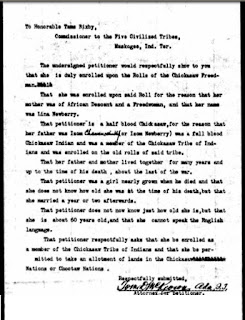The two cards are shown below, one on top of the other as there is only one name on the front. The front of Samuel's card clearly shows that he was born enslaved and the name of his slave holder is reflected as Chawanochubby. The second side of the card (see second card below) clearly illustrates that the slave holder and the father of Samuel were indeed the same man. Chawanochubby was his father.
The National Archives at Ft. Worth, Ft. Worth Texas 1868-1914
NAI Number: 251747, Record Group Title: Records of the Bureau of Indian Affairs, Record Group 75
Close up of front of card
Close up of back side
The Application Jacket
When examining the application jacket one can learn so much more about the historical context and circumstance in which Samuel, the applicant lived. First of all Samuel lived as a Chickasaw, and was considered to be Chickasaw by those who knew him. There were witnesses who spoke on his behalf and those witnesses verified that he was raised by both his father and his mother together and that his parents were considered to be a married couple. There were other siblings, and they were all raised in the same household as Chickasaws.
National
Archives Publication M1301
Applications for Enrollment
(Also accessed from Fold3.com, Native American Collection, Choctaw Freedmen)
Applications for Enrollment
(Also accessed from Fold3.com, Native American Collection, Choctaw Freedmen)
Samuel had a sister who was still living and she too was applying for enrollment. She spoke only Chickasaw and required the assistance of a translator to assist her. She told her story and it was interpreted as part of the record.
(Same as above)
The interpreter was Munroe Clark who was fully bilingual in both English and Chickasaw.
(Same as above)
Mollie Parker Chickasaw Witness
(Same as above)
The Decision
The basic request was that Samuel wished to be placed on the blood roll as the son of his father, a Chickasaw Indian. However, the request for both Samuel and his sister was denied. The reasoning was that they were slaves, since their mother was a slave. Of course their status at birth was not of their own control, but the decision to punish people for being born into bondage began and is a policy that continues to this day. The file was quickly closed after the decision to deny was made.
Source: Same as above
Source: Same as above
In spite of the blood and the cultural ties to their nation, and even the need for interpreters for sister Mason Clark, they were placed on the Freedmen roll. The record however speaks to an amazing richness in their history. The file itself reflects relationships that developed between people, even in spite of the legal and cultural demands of a hostile south, a hostile slave holding Indian tribe, and the larger community from the nearby United States.
Descendants of Mason Clark and Samuel Chawanochubby have clear documentation of their ties, and direct lineage to their nation of Chickasaw people, by culture, by langage and by blood. They were and they are Chickasaws.
The story of what happened to this family is a small story, but the story of what happened to the larger community of Freedmen is the greater story. For the descendants of this family it is the story of what happened to their ancestors. But for many more it a hidden story of part of Oklahoma. Regardless of where the family names were placed, today--100 plus years later, it must be stated that all of the histories are important. And this must be said-- One status does not out-weigh nor have greater value over another. The hope is that someday all will acknowledge their shared past.
From this story of Samuel Chawanochubby that argument against African-Chickasaw ancestored people, this man and his story is simple. He was a man who was clearly tied to the tribe through his father's blood, through his mother's toil and her blood and through his own tie to the land and soil upon which he lived his life. He was Chickasaw.
**********
This
is the 48th article in a 52-article series devoted to sharing
histories of families once held as enslaved people in Indian Territory, now
known as Oklahoma. The focus is on the Freedmen of the Five Civilized Tribes,
and these posts are part of an ongoing project to document 52 families in 52
weeks








No comments:
Post a Comment